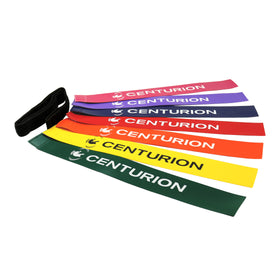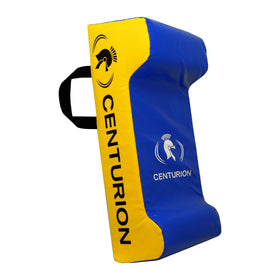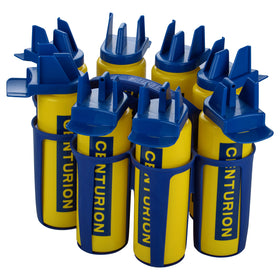Rugby Blog
History of Sale Sharks
by Leana Kell
Sale Sharks are one of the leading professional Rugby Union clubs in the country, competing in the Premiership since 1994.
Originally based in Manchester in the suburb of Sale, the club now plays at the AJ Bell Stadium in Salford and shares its ground with the Salford Red Devils rugby league club. Centurion takes a look below at the history of one of the oldest and most successful rugby clubs in England.
Early history
Sale FC was originally founded in 1861 and the club began its career playing at various grounds in the Borough before settling at Heywood Road in 1905. The club preceded to dominate the game of rugby in the North of England, and in 1911, Sale FC made history winning 24 out of 26 matches played, and drawing in the remaining two. It wasn't long before key players were making an appearance such as Pat Davies who was the first Sharks player to made his debut in 1927. During the 1930s, further international players made an appearance to include Hal Sever, Claude Davey, Wilfred Wooler and Ken Fyfe. Over the next fifty years, Sale FC continued to proudly dominate amateur rugby and between 1972 and 1987, the club celebrated winning the county cup championships for the fifteenth consecutive season.
The professional era
Paul Turner joined the Sale Sharks in the 1990s as a coach and his presence helped the team do well on a national and club level. In 1994, the team was promoted to the rugby union premier division, however, despite the promotion the club struggled financially toward the end of the decade when a series of defeats led to a drop in crowd numbers resulting in a loss of backing from a number of major club funders. After narrowly missing relegation, local businessman Brian Kennedy stepped in and secured the club's finances in time for the team to enter the professional era. The name Sharks was adopted in 1999.
At the beginning of 2000, Peter Deakin left the Warrington Wolves to become chief executive of the Sale Sharks. His time with the club was sadly short-lived due to a serious illness that claimed his life in 2003, but Deakin managed to make a significant impact in raising the club's profile in the short time he had with them. His involvement was pivotal in raising the profile of the under-21s academy which has brought on a number of Sale's younger players in recent years.
During the first two seasons of the Premiership, the Sharks lacked the confidence they had shown in lower divisions only making 11th place in 2000 and 10th place in 2001, only narrowly avoiding relegation. In 2002, former players Jim Mallinder and Steve Diamond joined the team as a coaching partnership, and at the end of the 2002, the Sharks had improved dramatically, placed runners-up in the premiership and able to qualify for the Heineken Cup.
Edgeley Park & AJ Bell Stadium

With the club's newfound success came the decision to move the club's premises away from the home ground Sale FC had dominated since the very beginning and into a 10,000 seat stadium at Edgeley Park which they shared with football team Stockport County. The club continued to use Heywood Road for the under-21s and reserve matches. In 2012, the club left Edgeley Park and moved to the newly built AJ Bell Stadium in Salford where they remain to this day. The stadium can hold a capacity of up to 20,000 spectators and will serve as one of the two venues for the 2016 World Rugby Under 20 Championship.
The Premiership
In 2004, French coach Philippe St Andre joined the team as Director of Rugby and there followed a series of international transfers to include key players such as Robert Todd and Sebastian Chabal. The Sale Sharks celebrated a momentous year finishing third in the Premiership and winning the European Challenge Cup beating Pau 27-3.
The 2005 season began well with impressive performances in the Six Nations and Autumn Internationals leaving the Sharks top of the Premiership after winning the league final against Leicester Tigers 45-10 at Twickenham. Little did the Sharks know that an even more momentous year lay ahead.
With new additions to the squad in the 2005–2006 season to include Lionel Faure, Samoan back Elvis Seveali'i and Welsh number eight Nathan Bonner-Evan, the Sale Sharks were able to build on their European Challenge Cup success, winning 16 games out of 22 to finish two games clear at the top of the table and subsequently winning the highly acclaimed 2006 Guinness Premiership title with a 45 – 20 win against Leicester Tigers - the Club's biggest achievement in professional history to date.
The later years
In the years that followed, the club was beset by injuries and player absence during international matches which meant they were unable to repeat the achievement of 2006. The Sharks continued to struggle which prompted Brian Kennedy, the club's owner, to recall Steve Diamond as Executive Director of Sport in January 2011 to bring a fresh approach to the club.
In 2012, the club decided to leave Edgeley Park and move to the newly built AJ Bell Stadium in Salford. The move signified a better end to a fledgling 2012/13 season whereby the Sharks managed to turn things around and remain in the Aviva Premiership despite the threat of relegation.
The 2013/14 season proved much better for the Sharks thanks to the backing of Steve Diamond and his team, and the club finished sixth in the Premiership and qualified for the new European Rugby Champions Cup as well as reaching the quarter finals of the Challenge Cup before losing to Northampton Saints. In 2014/15, the Sharks dropped down to seventh place in the Premiership and finished bottom of their pool in the European Rugby Champions Cup.
The Sharks remain one of the leading sides in Europe boasting a star studded squad including internationals from across the globe, with three Sharks forming part of the England squad in the Rugby World Cup 2015 - Phil Mackenzie, TJ Ioane and Jonny Leota. At the start of the current 2015/16 season, the Sharks signed a further four experienced players to include Springbok tighthead Brian Mujati, All Black second row Bryn Evans, Irish legend Peter Stringer and former hooker Neil Briggs.




